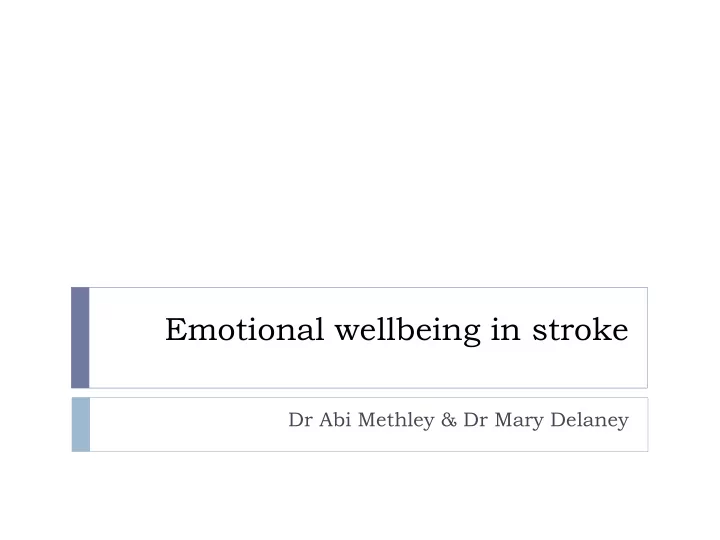

Emotional wellbeing in stroke Dr Abi Methley & Dr Mary Delaney
Aims and Learning Outcomes Understanding psychological reactions to stroke Some practical ideas for managing psychological well being in stroke settings A brief intervention to Acceptance and Commitment Therapy values based working. Signposting to further information and resources Self care – our own psychological wellbeing Whistle stop tour!
What are your hopes for today’s training?
Contents The role of the MDT and Clinical Psychology in emotional reactions to stroke Symptoms of psychological distress Causes of psychological distress Practical hints and tips Signposting, resources, when to refer on.
Everybody’s business…… “If you want to heal the body, you must first heal the mind” Plato – 327-347 BC We’re not just legs and arms and a mouth. We are human beings with a mixture of emotions. All these feelings, self esteem, self worth, confidence, identity, they’re all under attack after a stroke. You can feel vulnerable, frightened and you can lose yourself. Psychological support puts you back together again - especially psychological support from someone who’s been down that road before. The timing can’t be predicted. Sometimes it’s when you come out into your real world after hospital or it may be two - or more - years later when you discover that you will not make a ‘full’ recovery. It’s about reinvention and finding direction. Harry Clarke , Counsellor at Connect who has aphasia
Experiences of a counsellor for people with stroke Stroke survivor who works as a counsellor at Connect https://www.youtube.com/watch?v=09nnQBToa_8
Stroke survivor experiences “I wish I had known that mental problems can come on later on, like depression and fatigue. I was so frightened” “They kept saying ‘you will get better’. Things got worse - tears, suicidal thoughts. They frightened me more than the stroke”
Barriers E.g. Time, confidence, training Fear of Falling clinical examples Supervision Saving time in long run Overall team time Person centred approach Normalising fear
Emotional distress May reduce participation in rehabilitation Can result in longer episodes of rehabilitation Can effect a person’s overall ability to progress/adjust after stroke If not addressed this can result in extra demands being placed on health care services Can influence negatively mortality rates post-stroke Doubles the risk of suicide
Stepped care model
Emotional reactions to stroke Depression + apathy Anxiety Emotionalism Post-traumatic Stress Disorder Grief/Loss Needs of carers and family members Complex interplay of various factors, individualized person centered approach.
Emotional distress Depressed/Low mood for the most of the day Reduced pleasure in activities Change in appetite (increase or decrease) Sleep problems (decrease or increase in amount) Agitation Fatigue/Loss of Energy Reduced motivation Feelings of Worthlessness/Excessive or Inappropriate Guilt Reduced ability to think or concentrate or indecisiveness Recurrent thoughts of self-harm/death/suicide
Fears/worries eg, falling, having another stroke, financial worries, how they or family will cope after the stroke. Physical sensations eg heart-pounding, difficulty breathing, sweating etc Inability to relax. Avoidance of fearful places eg supermarket, social activities . PTSD Anger
Stages of recovery As cognitive deficits decrease, awareness increases. But increase in awareness/insight is often accompanied by an increase in anxiety and depression
Emotionalism Involuntary, uncontrollable episodes of crying and/or laughing. Episodes sometimes incongruent to reported mood…don’t match up to how person actually says they are feeling. E.g.Score okay on HADS. Sometimes feels like an over-reaction. Sudden and unpredictable. Can last a few seconds…up to several minutes. May happen several times per day. May last over a year (1 in 10) Distraction can be helpful. Comforting person can exacerbate symptoms
What can I do? Managing expectations and endings Active listening Goal setting – Values based goals Signposting to resources Managing endings and expectations for rehabilitation
ACT Values A meaningful life STROKE Grief Struggle Suffering
ACT: Experiential avoidance “ Headstuck! What is Experiential Avoidance ?” https://www.youtube.com/watch?v=C-ZuqeyxULM
ACT Values exercises 90 th Birthday What makes life worth living?
Active listening Demonstrate that you are listening with your body language and by summarising what they have said so far Give them time and space to talk It may be better not to offer solutions straight away….listen to ensure you have the full story Normalise their feelings in the light of their stroke “its common for people to feel like that after a stroke” If someone is crying…allow them more time to speak and normalise their tearfulness (rather than try to stop it) Sometimes doing ‘nothing’ is the most supportive thing you can do
Managing endings Planning the ending from the assessment stage Managing expectations Dealing with plateaus Avoiding feelings of abandonment Ending letters – who do you write to? What is the content? What positive written feedback do you give your patients? Realistic goal setting – guided failure?
Compassion focussed therapy For people who suffer with high levels of shame and self- criticism Helps people to feel more compassion towards themselves, with a positive impact on their ability to cope Exercise: How would you treat a friend?
Self Care Emotional distressing work at times Who looks after us? Self care Team culture around self care #149 Culture and GOB Mindfulness Practice what we preach !!!
Risk Warning signs Helplessness, hopelessness, worthlessness Despair Previous history What/How to ask? Will asking increase risk?
References and Resources HEADSPACE app and Youtube videos – Mindfulness by Andy Puddicombe. Good introduction. Mindfulnesss – http://www.breathworks- mindfulness.org.uk/mindfulness-for-health/long-term-health- conditions Russ Harris – You tube videos, book: “The Happiness Trap” Rebuilding your life after stroke by Reg Morris Self care for the Real World by Nadia Narain
Thank you Any questions or comments?
Recommend
More recommend